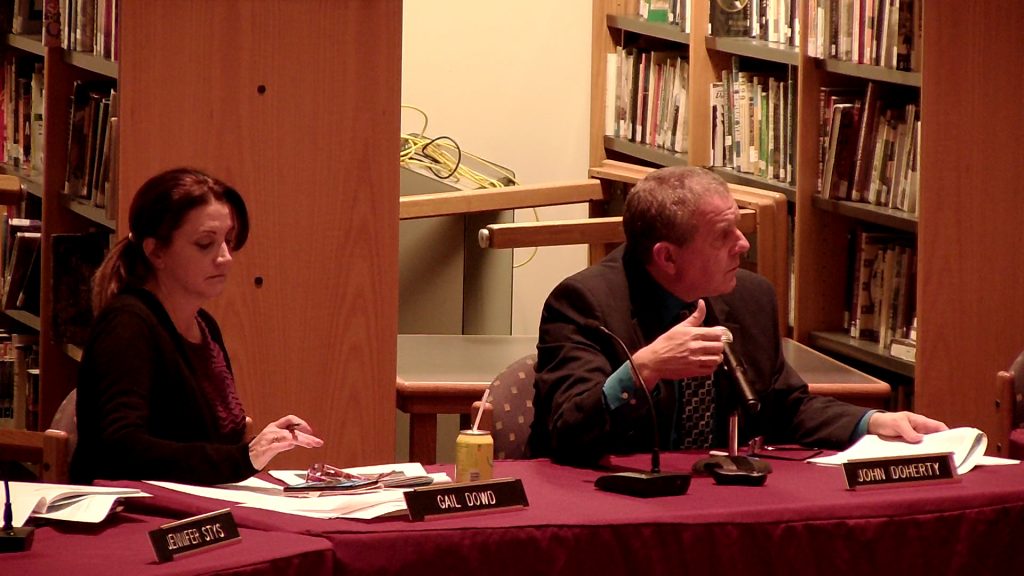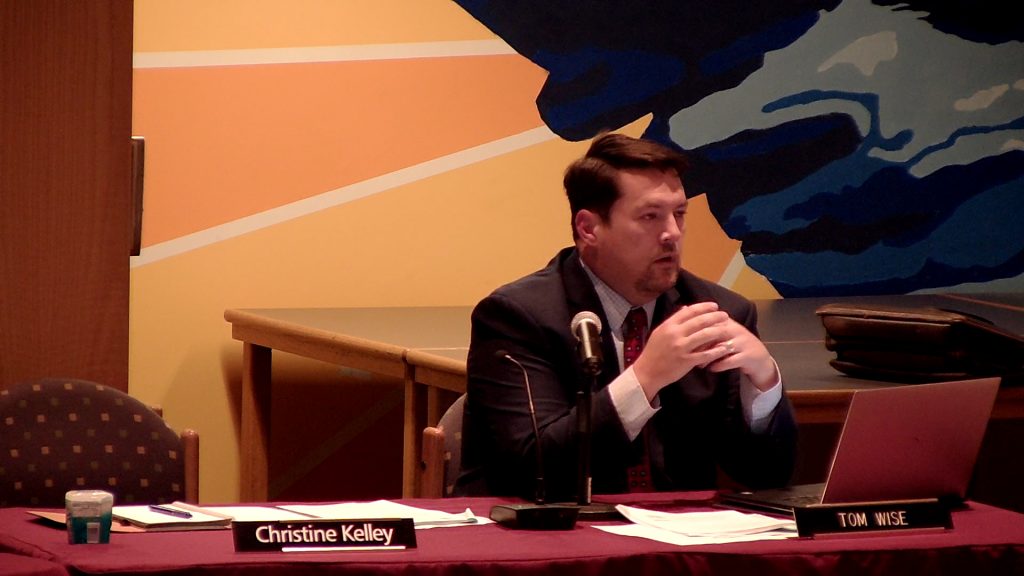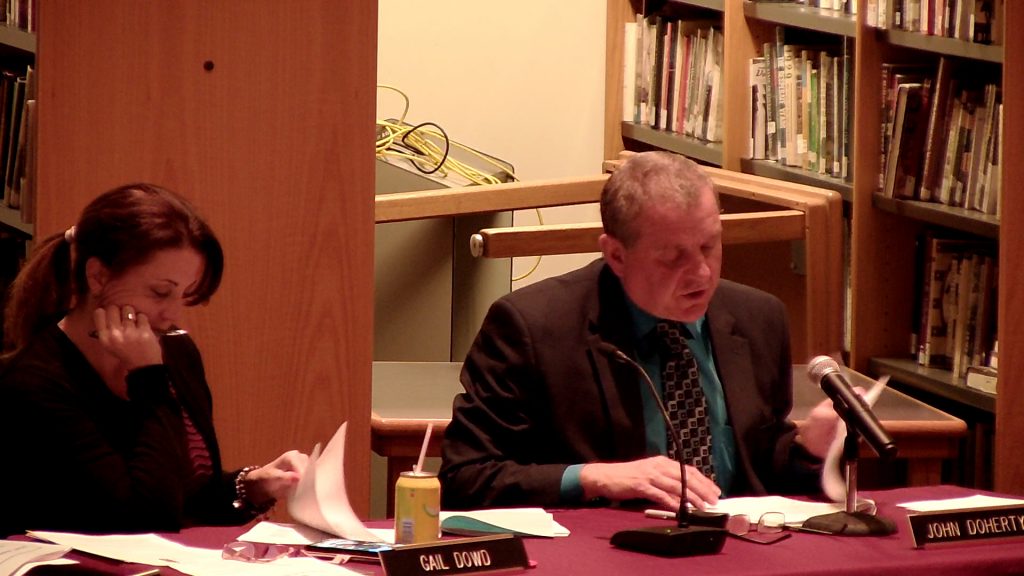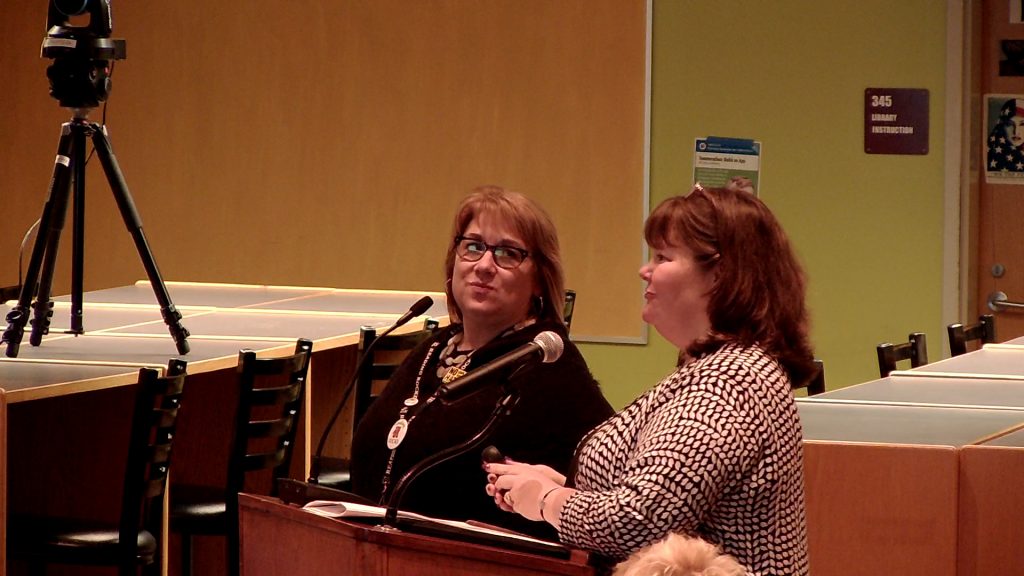 The School Committee voted 5-1 to approve both the 2019-20 District Improvement Plan and the 2019-20 superintendent’s goals on October 28. Superintendent John Doherty began with a brief reminder of the process of the planning and goal setting. As a result of Doherty’s leave of absence over the summer, as well as plans to develop a “Vision of the Graduate” during the coming year, both the improvement plan and the goals are for a one-year period only. Doherty explained that the development of the “Vision of the Graduate” could change the district vision statement and have an effect on future plans. The intention is for the next district improvement plan to be a three-year plan. In determining both the improvement plan and his goals, Doherty stated that he had to ask himself the question, “Is this realistic by June?”
The School Committee voted 5-1 to approve both the 2019-20 District Improvement Plan and the 2019-20 superintendent’s goals on October 28. Superintendent John Doherty began with a brief reminder of the process of the planning and goal setting. As a result of Doherty’s leave of absence over the summer, as well as plans to develop a “Vision of the Graduate” during the coming year, both the improvement plan and the goals are for a one-year period only. Doherty explained that the development of the “Vision of the Graduate” could change the district vision statement and have an effect on future plans. The intention is for the next district improvement plan to be a three-year plan. In determining both the improvement plan and his goals, Doherty stated that he had to ask himself the question, “Is this realistic by June?”
Goals for the district in 2019-20 include an increase in student engagement, academic improvements, a decrease in discipline referrals, and a reduction in the proportion of students with ten or more absences. Included in the academic improvement goal is a goal to see a decrease in the achievement gap between high needs subgroups and the general student population. The plan also includes the completion of curriculum guides for all levels and subjects with planning and pacing guides by December 2020.
 School Committee member Thomas Wise raised the question as to why some of the goals, specifically the curriculum guides, were planned to be completed beyond the scope of review, which is in June of 2020. Doherty explained that the nature of the creation of the guides made it difficult to determine exactly what percentage of the guides or which of the guides might be completed by June. The plan is to update the committee, reporting on progress, in time for the review period. Wise countered that these guides had been promised for years, though much progress had been made in the last year. Doherty assured the committee that they would be completed by the December 2020 deadline.
School Committee member Thomas Wise raised the question as to why some of the goals, specifically the curriculum guides, were planned to be completed beyond the scope of review, which is in June of 2020. Doherty explained that the nature of the creation of the guides made it difficult to determine exactly what percentage of the guides or which of the guides might be completed by June. The plan is to update the committee, reporting on progress, in time for the review period. Wise countered that these guides had been promised for years, though much progress had been made in the last year. Doherty assured the committee that they would be completed by the December 2020 deadline.
Doherty explained his goals to the committee, which are tied to the improvement plan. He outlined four goals: to implement the district improvement plan, improve the physical and psychological security of the schools, develop a multi-year capital plan, and develop a district-wide “Vision of the Graduate.” Doherty expressed excitement about the fourth goal. The plan is to develop a vision as to what skills and “habits of the mind” a Reading Public Schools student should possess upon graduation. This vision will be developed over two years with input from community leaders, students, and educators.
Wise questioned some of the lack of specificity in the goals – specifically, by how much or by what percentage would the achievement gap be reduced. Doherty stated that he could come up with a numerical goal, but given that it is only a one-year plan, any numerical goal would be completely arbitrary. Wise then shifted to ask what common measure would be used to determine success. He wanted to know if the committee planned to use state assessments or some other tool to measure progress toward the goal. School Committee member Linda Snow Dockser responded, reminding the committee that tests are only one way of measuring progress. “Standardized tests are not equitable measures of growth.” Snow Dockser commented.
 When the question of whether or not to vote on the District Improvement Plan and Superintendent’s Goals, or to continue the discussion at the November 7 meeting, Wise pointed out that the committee had not yet seen the School Improvement Plans for each school. Wise believes that these plans should inform the district plan, and, as a result, a vote on the district plan before seeing the school plans would be premature. Doherty assured the committee that the school plans will align with the district plan, and in fact, help focus those plans. Wise commented that Massachusetts General Law required school committee input into the school plans and that they could not be completed without it. School Committee member Jeanne Borawski suggested that Town Counsel be consulted regarding the law, but also commented that the school plans would not be completed until January, more than halfway through the year if the committee had to be involved. Doherty promised that he would report on the school improvement plans to the committee upon completion.
When the question of whether or not to vote on the District Improvement Plan and Superintendent’s Goals, or to continue the discussion at the November 7 meeting, Wise pointed out that the committee had not yet seen the School Improvement Plans for each school. Wise believes that these plans should inform the district plan, and, as a result, a vote on the district plan before seeing the school plans would be premature. Doherty assured the committee that the school plans will align with the district plan, and in fact, help focus those plans. Wise commented that Massachusetts General Law required school committee input into the school plans and that they could not be completed without it. School Committee member Jeanne Borawski suggested that Town Counsel be consulted regarding the law, but also commented that the school plans would not be completed until January, more than halfway through the year if the committee had to be involved. Doherty promised that he would report on the school improvement plans to the committee upon completion.
Wise then questioned the process of the school improvement plan creation, stating that some people on the school councils had reported to him that the process was not collaborative. Dockser responded that she had served on the school councils of three different schools in town and believes that the process of creating the improvement plans is very collaborative. She followed this up with the thought that those who did not believe it was collaborative were people whose ideas, though considered, were not included in the final products.
The vote approving both the District Improvement Plan and the Superintendent’s goals carried 5-1, with Wise casting the dissenting vote both times.
 Lisa Marie Ippolito, principal of the Joshua Eaton Elementary School, reported on an early childhood screening grant that the school had received from the state to pilot “iStation”, an assessment program for diagnosing dyslexia and other reading concerns. The program piloted was chosen by the state and includes professional development from the software company. Ippolito reported that the children in grades K-2 at Joshua Eaton enjoy the program which uses iPads and other technology to perform the testing. The teachers, as well as Ippolito, will report to the state regarding their observations on the program. This grant was given as a first step toward this type of assessment being required by the state for all students.
Lisa Marie Ippolito, principal of the Joshua Eaton Elementary School, reported on an early childhood screening grant that the school had received from the state to pilot “iStation”, an assessment program for diagnosing dyslexia and other reading concerns. The program piloted was chosen by the state and includes professional development from the software company. Ippolito reported that the children in grades K-2 at Joshua Eaton enjoy the program which uses iPads and other technology to perform the testing. The teachers, as well as Ippolito, will report to the state regarding their observations on the program. This grant was given as a first step toward this type of assessment being required by the state for all students.
The School Committee adjourned at 10:25 pm.
